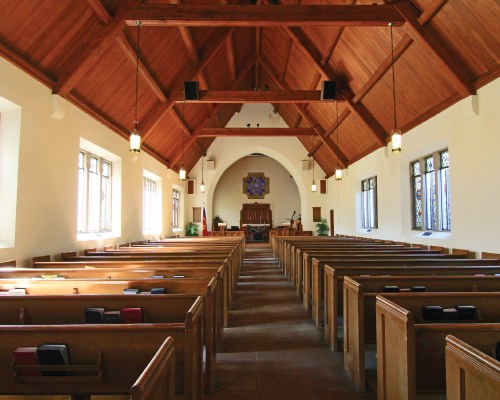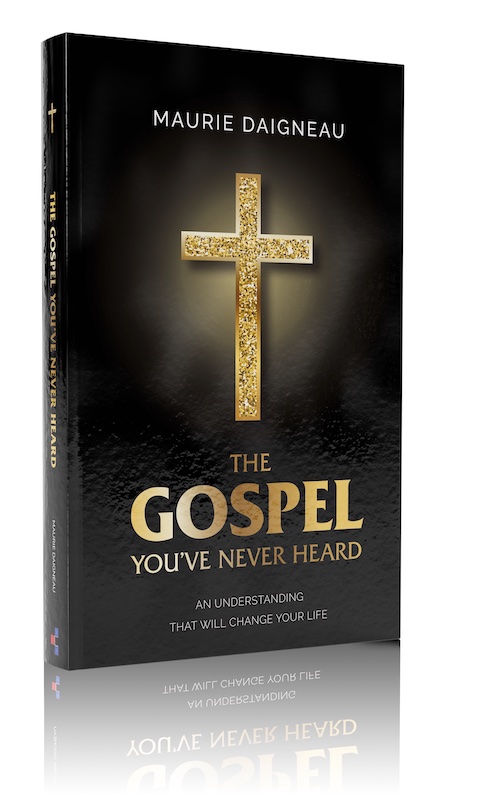There are only two terms used to describe a person’s inner spiritual condition from God’s perspective: “unregenerate” and “regenerate.” “Unregenerate” or “natural” is the post-fall-of-Adam condition of spiritual bondage to the indwelling presence of sin. As the Scripture says: “through one transgression there resulted [God-determined] condemnation to all men” (Rom. 5:18a). From a spiritual perspective, it is referred to as an inherited death (see Rom. 5:12–14) and it is precisely the death that God warned of should they eat of the forbidden fruit (see Gen. 2:16-17). Such is the spiritual condition into which all human beings are born. There is no escape from this condition except by a confession of faith in the Lord Jesus Christ. In contrast, “regenerate” refers to the born again (see John 3:3) spiritual condition of anyone who has made such a confession of faith in Christ and has thereby received the indwelling presence of the Holy Spirit.
From God’s perspective, and by His design, there are only two inner spiritual conditions in which all human beings exist: unregenerate or regenerate. The earlier allegory (car, driver, spiritual passengers, etc.) gave a picture of the difference between those two conditions. Remember that the regenerate condition has been possible only since the resurrection of Jesus and the coming of the Holy Spirit. In a certain sense, this chapter is also allegorical, but remains entirely scriptural. Some of Paul’s Romans letter affirms that the spiritual condition has been a part of God’s predetermined plan from the beginning. That’s another example of “…the manifold wisdom of God” (Eph. 3:10a) being revealed in the writing of Paul. From a spiritual perspective, no matter who we are or what we believe, we all currently exist in one or the other of these two conditions.
Regeneration as a Matter of Individual Choice
In Romans 9:10, Paul begins his explanation of this unregenerate/regenerate aspect of God’s predetermined plan, recalling for them well-known events from Israel’s history. He references twins (Esau and Jacob) who were born to Isaac by Rebekah. In order to accurately understand this narrative, we need to understand that the twins are an allegorical reference to the unregenerate (Esau) and regenerate (Jacob) human spiritual condition. Paul notes that the reality of these conditions, and how they would be established, was predetermined (by God) prior to the birth of the twins “for though the twins were not yet born, and had not done anything good or bad, in order that God’s purpose according to His choice might stand, not because of works, but because of Him who calls…” (Rom. 9:11).
In other words, by the predetermined plan of God, Adam’s unregenerate condition (captivity to sin) occurred after his creation as a result of the choice he made to eat of the forbidden fruit; and likewise, the reality of spiritual regeneration (being born again) is available only as a result of a choice a person makes to accept Jesus as Lord. Both conditions occur as a result of a free-choice response to an action (or call) of God. In the first, the placing of the law (don’t eat…) in the garden, and in the second, the sending of His Son into the world.
It is important here to remember something Paul had noted earlier about the two spiritual conditions (see Romans 5:12–21). The unregenerate condition was the result of the disobedience of the one (Adam), yet by the determination of God, the consequence of that disobedience (spiritual death) fell to the whole of humanity. By contrast, though the obedience of the One (Christ) resulted in the justification of life for the whole of humanity, the gift of righteousness (regeneration) does not automatically fall to everyone; again, by the predetermined plan of God, it is available only to those who will choose to embrace Jesus as Lord. In both instances God pulled the trigger. In the first, the effect was universal; in the second, the effect is entirely a matter of individual choice.
Paul expands his unregenerate/regenerate explanation by referencing a statement (see Rom. 9:12) made by God to Rebekah regarding difficulties she was having as the babies struggled together in her womb:
And the LORD said to her,
“Two nations are in your womb;
And two peoples shall be separated from your body;
And one people shall be stronger than the other;
And the older shall serve the younger.” (Gen. 25:23)
The two nations that were in her womb, as represented by Esau and Jacob, were the unregenerate and regenerate human conditions. Regenerate humanity will be stronger than unregenerate humanity because they will be a nation that possesses the Holy Spirit. In addition, contrary to Jewish tradition, the older unregenerate humanity (Esau was the first born) will serve the younger regenerate humanity by evidencing an inability, no matter how great their desire, to overcome the knowledge and power of sin.
The entire Old Testament is a four-thousand-year history of unregenerate humanity’s struggle with the
indwelling presence of sin. The uniqueness of Israel’s portion of that history is that despite direct and frequent interaction with God, and incredible God-event after incredible God-event, Israel still demonstrated repetitive disobedience. That is precisely how the older, unregenerate, was serving the younger, regenerate. By example and daily evidence, the older was teaching the yet-to-arrive younger that no matter how great the desire of the human spirit to be living rightly before God, it simply cannot overcome the influence of the
indwelling presence of sin.
God Is Not Unjust
Paul addresses what becomes the obvious question as he continues his writing: is it not unjust of God to call people to an objective that by His design they can never accomplish? May it never be! God is free to do whatever He wants, to have mercy and compassion on whomever He wills (see Rom. 9:15). And the extension of such mercy and compassion is not determined in any circumstance by the willing or running of any man (see v. 16). God is even free to harden the heart of a man if it serves His predetermined plan (see vv. 17–18).
Why then does He still find fault, for who can resist His will (see v. 19)? Ah, but would the thing molded dare say to the molder, “Why did you make me like this?” (v. 20b). Doesn’t God have the right over the clay to make from the same lump one vessel (regenerate) for honorable use and another (unregenerate) for common use? Of course He does!
Paul makes it clear that the greater point to be understood from this is the incredible patience that God displayed throughout that history. “Vessels of wrath prepared for destruction” (see v. 22) could have been entirely and justifiably eliminated at any time, as was almost the case in the days of Noah. But time after time, century after century, God endured the repetitive pattern of disobedience (see Rom. 3:25–26). “And He did so in order that He might make known [at a time of His choosing] the riches of His glory upon vessels of mercy, which He prepared beforehand for glory” (Rom. 9:23). Look at a passage from Psalm 102:
This will be written for the generation to come;
That a people yet to be created may praise the LORD.
For He looked down from His holy height;
From heaven the LORD gazed upon the earth,
To hear the groaning of the prisoner;
To set free those who were doomed to death;
That men may tell of the name of the LORD in Zion,
And His praise in Jerusalem;
When the peoples are gathered together,
And the kingdoms, to serve the LORD. (Ps. 102:18—22)
The Coming Regenerate Humanity
The generation to come and the people yet to be created is a reference to regenerate humanity. The groaning of the prisoner is the groaning that emanates from those who were doomed to [spiritual] death (the whole of humanity) by the very God who was looking down upon them. Vessels of wrath (unregenerate humanity) prepared for destruction would be transformed into vessels of mercy (regenerate humanity).
We know the manner by which that new generation of free human beings would be created. “Thanks be to God through Jesus Christ our Lord!” (Rom. 7:25a). And when the Lord finally gathers His people and His kingdoms (heavenly and earthly) together, of what do these verses suggest His human creation will be speaking? They will be praising the miracle of the transformation that they had received. “Oh, the depth of the riches both of the wisdom and knowledge of God!” (Rom. 11:33a).
The bigger picture of life is a picture of the supernatural and currently invisible life that overlays our
earthly experience. From this we can begin to understand that from God’s perspective the priority of life has never been about human accomplishment (see Mark 8:36–38).
Seeing from God’s Perspective
From God’s perspective, the true value of our existence lies not in the possession of life itself, but rather in the opportunity that life presents to know God and then to choose God, all within the framework of the knowledge of God that is available to us, whatever our time of living. If life were nothing more or less than a fair opportunity for human accomplishment, then in the name of justness, it should be an opportunity that is fairly and equally given to everyone. But if the history of the world tells us anything, it is that there is nothing fair and/or equal about the opportunity life provides.
No one determines the place or time of their birth. Of course when understood through the lens of the gospel, we can know and understand that by the predetermined plan of God, “…we are of God [we exist by His hand], and the whole world lies in the power of the evil one” (1 John 5:19). The experience of life in that kind of an environment is not the principal reason we were created. There has always been a much bigger picture to the reason we exist. It has always been about the possibility of an eternal residency in “a new heaven and a new earth” (Rev. 21:1). It will remain that way until our Father leans over to our Lord and says, “Son, it is time to return!”
Many people have wondered about the length of the stand-alone unregenerate period. Four thousand years seems like a long time to endure such captivity. Yet there is solace in the words of Peter, “But do not let this one fact escape your notice…that with the Lord one day is as a thousand years, and a thousand years as one day” (2 Peter 3:8).
Those words help us to realize that time has always been in the determinative hands of God; His measure is eternal in scope. Nevertheless, while we are still among the living we should have no greater anticipation for anything than for the return of the Lord and the arrival of the Day of Judgment.
That hope is a motivation for a daily endeavor to let the Lord be living through us. By the time He returns we may have been asleep for some period of time, but we can be certain that the day will eventually come. We can also have an equally high level of anticipation that there will be a meting out of perfect justness. Imagine being able to watch a decision-making process that will be impervious to erroneous argument, literally a process without error. And it will apply to every human being who will have ever lived.
What a comfort!


